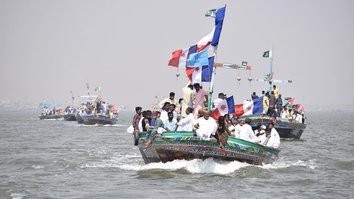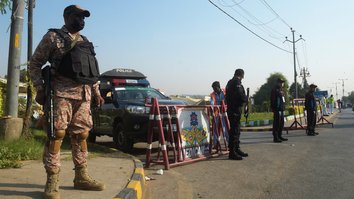KARACHI -- A new joint venture between Pakistan and China to develop Karachi's coast will not only displace more than a half-million inhabitants and harm protected forests, but also fuel ethnic insurgency in Sindh province, urban planners and security analysts say.
Islamabad and Beijing on September 23 inked an agreement on the Karachi Coastal Comprehensive Development Zone (KCCDZ) project with direct Chinese investment.
The agreement was signed during the 10th Joint Co-operation Committee meeting of the China-Pakistan Economic Corridor (CPEC), after a gap of almost two years.
The project is part of the CPEC, a flagship project of China's Belt and Road Initiative (BRI).
![A model of the Karachi Coastal Comprehensive Development Zone on the reclaimed land of Karachi Port Trust. [Ministry of Maritime Affairs]](/cnmi_pf/images/2021/10/12/32076-kccdz-plan-karachi-585_329.jpg)
A model of the Karachi Coastal Comprehensive Development Zone on the reclaimed land of Karachi Port Trust. [Ministry of Maritime Affairs]
"Developed on reclaimed area of approximately 640 hectares [or 1,581 acres] on the Western backwaters marshland of Karachi Port Trust, the KCCDZ will be a flagship project for not only Pakistan but the entire region," the Pakistani Ministry of Maritime Affairs said in a statement September 25.
The $3.5 billion project will lead to the relocation of more than 20,000 families living in the surrounding slums, the ministry said.
However, those plans provide no assistance for the vast majority of residents, say urban planners and rights activists, who point to the more than half-million inhabitants of Machar Colony.
The KCCDZ will claim all the territory of Machar Colony, one of the oldest informal settlements, said Mohammad Toheed, an urban planner associated with Karachi Urban Lab.
The colony's entire population will be displaced, he said, adding that "the government does not have any comprehensive relocation plan".
"The majority of the residents in Machar Colony are Bengali and Rohingya migrants who have been living in the neighbourhood for the past several decades. Most of them are stateless and do not have citizenship documents," said Toheed.
"Although we have been living in the worst conditions, we will not allow the authorities to throw us out of our houses in the name of development," said Minhajud Din, a social worker of Machar Colony.
The government has not provided alternative accommodation or compensation after displacing residents for development projects, he said.
Fueling ethnic insurgency
The exponential growth of Chinese influence in Sindh and Balochistan provinces -- with Chinese companies exploiting local resources without care or concern for the impact on locals -- is driving unrest, say security analysts.
Qadir Magsi, leader of the Sindh Taraqi Pasand Party, a Sindhi ethnic political party, criticised the government for secretly conceiving projects, such as the KCCDZ along the coastal belt.
The government must publicise the details, he said.
"We are opposing the development process, and the occupation of Sindh's land must not be tolerated or allowed," Magsi said.
"BRI-linked projects, such as the KCCDZ, will further spur anti-China sentiment that Sindhi ethnic militants are exploiting in the province," said a Karachi-based senior police officer.
Last year, Pakistan banned three ethnic Sindhi militant groups, including the Sindhudesh Revolutionary Army (SRA), for their alleged involvement in attacking BRI-linked projects in Sindh province.
In July 2020, the SRA teamed up with the Baloch Raji Aajoi Saangar (BRAS) -- a conglomerate of Balochistan's separatist groups that was formed to attack Chinese interests in the country.
"Pakistan's law enforcement agencies have succeeded in controlling Taliban militancy in the country through decade-long counterterrorism operations," said the police officer.
"But the government's plans, including the KCCDZ, its tolerance of Chinese trawlers' deep-sea fishing and injustices caused by BRI-linked projects in the Thar Desert region, have been fuelling a new wave of ethnic insurgency in the country."
Threat to protected forest
Meanwhile, the KCCDZ project will destroy critical mangrove forests in the region, according to concerned environmental activists.
It would not be the first time BRI projects have contributed to climate change and exposed the local population to serious health issues.
The potential loss of the natural barrier formed by the mangroves could put Karachi, a city of almost 20 million, at greater risk from violent storms and tsunamis, they warned.
"Area has mangroves... They are protected forests," Afia Salam, a Karachi-based environmentalist and journalist, tweeted on September 26, asking the residents to gear up for the fight against uprooting the mangroves.
The KCCDZ's planners "are going against #SC [the Pakistani Supreme Court] mandate of not allowing KPT [Karachi Port Trust] any contrustion [sic] activity & orders to use reclaimed land only for plantation," she said in the same tweet.

![A file photo shows Machar Colony, a neighbourhood in Karachi. A new joint venture of Pakistan and China to develop Karachi's coast will displace the more than half-million population of Machar Colony without assisting it. [Zarak Khan]](/cnmi_pf/images/2021/10/12/32064-karachi-585_329.jpg)






